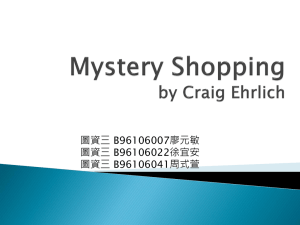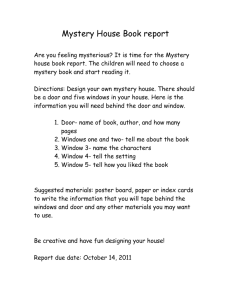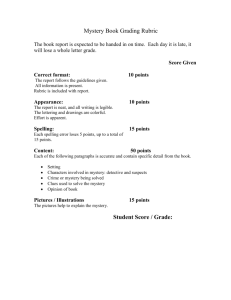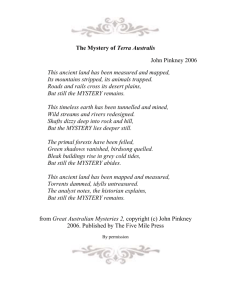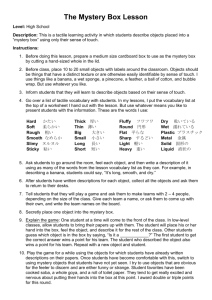Appendix 4e - Blackpool Borough Council
advertisement
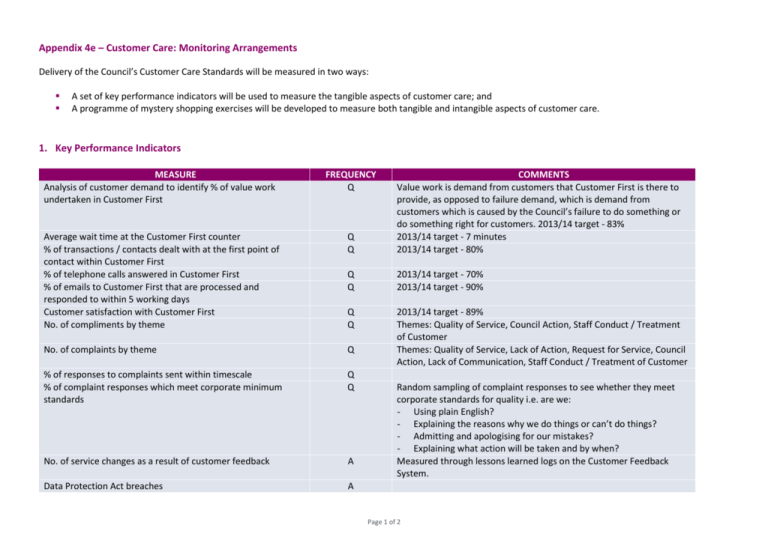
Appendix 4e – Customer Care: Monitoring Arrangements Delivery of the Council’s Customer Care Standards will be measured in two ways: A set of key performance indicators will be used to measure the tangible aspects of customer care; and A programme of mystery shopping exercises will be developed to measure both tangible and intangible aspects of customer care. 1. Key Performance Indicators MEASURE Analysis of customer demand to identify % of value work undertaken in Customer First FREQUENCY Q Average wait time at the Customer First counter % of transactions / contacts dealt with at the first point of contact within Customer First % of telephone calls answered in Customer First % of emails to Customer First that are processed and responded to within 5 working days Customer satisfaction with Customer First No. of compliments by theme Q Q COMMENTS Value work is demand from customers that Customer First is there to provide, as opposed to failure demand, which is demand from customers which is caused by the Council’s failure to do something or do something right for customers. 2013/14 target - 83% 2013/14 target - 7 minutes 2013/14 target - 80% Q Q 2013/14 target - 70% 2013/14 target - 90% Q Q No. of complaints by theme Q 2013/14 target - 89% Themes: Quality of Service, Council Action, Staff Conduct / Treatment of Customer Themes: Quality of Service, Lack of Action, Request for Service, Council Action, Lack of Communication, Staff Conduct / Treatment of Customer % of responses to complaints sent within timescale % of complaint responses which meet corporate minimum standards Q Q No. of service changes as a result of customer feedback A Data Protection Act breaches A Random sampling of complaint responses to see whether they meet corporate standards for quality i.e. are we: - Using plain English? - Explaining the reasons why we do things or can’t do things? - Admitting and apologising for our mistakes? - Explaining what action will be taken and by when? Measured through lessons learned logs on the Customer Feedback System. Page 1 of 2 Appendix 4e – Customer Care: Monitoring Arrangements 2. Mystery Shopping Exercises Mystery shopping is a tool used to measure the satisfaction of service users. It involves the use of trained evaluators to act as a customer and to objectively report back on their experience. This enables an organisation to explore the actual customer experience at a moment in time and provides a way of measuring performance against set standards. The table below provides some examples of the types of things that can be measured as part of mystery shopping exercises for different communication channels: TYPE OF CONTACT Telephone Enquiries Out of Hours Calls Call Backs Language Line Textphone / Minicom Fulfilment Track Emails Web Forms Websites Face-to-Face Letters WHAT CAN BE MEASURED? Contactability, speed of answering, efficiency, quality, call handling, transfers What do callers meet when ringing out of office hours, what facilities are there for leaving messages and how quickly are they called back Returned calls in response to messages left on answer phones or voicemail during office hours What facilities are there for callers who do not speak English? Contactability, speed of answering etc How reliably and quickly is material requested by phone received by post? Contactability, speed of answering, efficiency, quality, language, layout Contactability, speed of answering, efficiency, quality, language, layout Are telephone numbers and email addresses shown valid and up to date? How useable is the site? How quickly can simple tasks be achieved? Are premises easily accessible, well-signed, clean and in good condition? How welcoming are staff, how smart? Was there a wait and if so how long? How well did staff handle the enquiry? Contactability, speed of answering, efficiency, quality, language, layout Results from mystery shopping exercises can also be combined with other survey methods to provide a rich source of information. For example, questions about satisfaction with the Council which will be included in the Household Survey which will be undertaken in coming months. A detailed proposal for a pilot mystery shopping exercise will be developed by the Corporate Development Team for approval. Page 2 of 2
